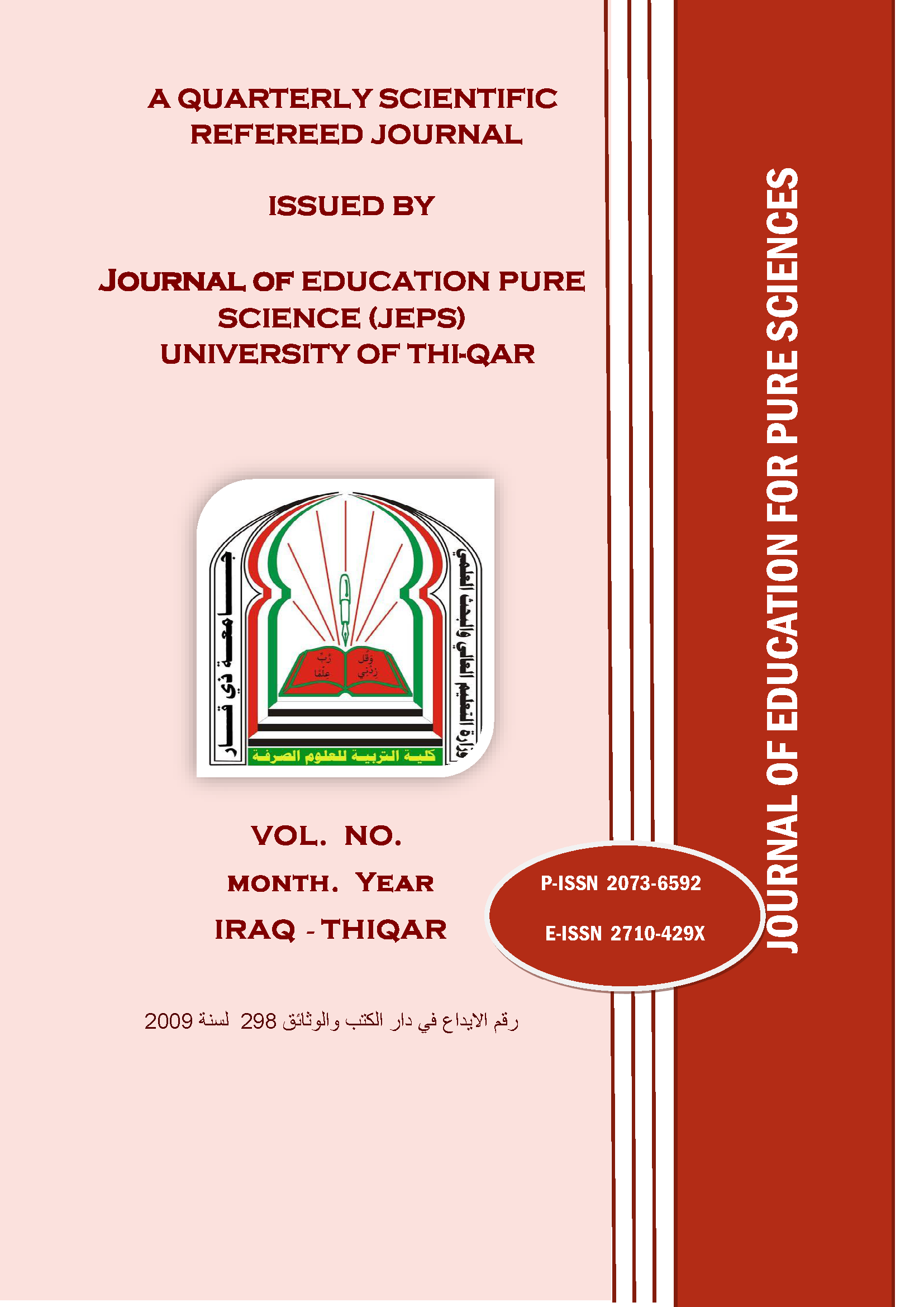Enhanced Machine Learning model for Student Academic Performance Prediction using Genetic algorithm and compare with CNN model
DOI:
https://doi.org/10.32792/jeps.v12i2.213الكلمات المفتاحية:
Prediction, Machine Learning، CNN، SVM، LR، ANN، Genetic algorithmالملخص
In this paper, a comparison between various machine learning algorithms for prediction of student
academic performance has been achieved. Students’ data is being acquired many resources such as elearning
resources, online and virtual courses and institutional technology. Many researches might use the
collected data to find out and comprehend students’ behaviors toward learning. The obtained data need to
be preprocessed then used to build prediction model. The achieved models are Support Vector Machine
(SVM), Logistic Regression (LR), Artificial Neural Network (ANN) with accuracies 99.99 %, 100 % and
99.99 % respectively. Genetic algorithm was used to adapt parameters of the algorithms to give best
accuracy. OULAD dataset was used for validation. Results showed that these algorithms are sufficient for
prediction of student academic performance and CNN is not needed for this purpose.
المراجع
Satyanarayana, A. and Nuckowski, M., 2016. Data mining using ensemble classifiers for improved
prediction of student academic performance.
Huang, S., & Fang, N. (2013). Predicting student academic performance in an engineering dynamics
course: A comparison of four types of predictive mathematical models. Computers & Education, 61,
-145.
Cohen, L., Manion, L., & Morrison, K. (2002). Research methods in education. Routledge.
Ware, W. B., & Galassi, J. P. (2006). Using correlational and prediction data to enhance student
achievement in K-12 schools: A practical application for school counselors. Professional School
Counseling, 344-356.
Yadav, S. K., & Pal, S. (2012). Data mining: A prediction for performance improvement of
engineering students using classification. arXiv preprint arXiv:1203.3832.
Oyedeji, A.O., Salami, A.M., Folorunsho, O. and Abolade, O.R., 2020. Analysis and prediction of
student academic performance using machine learning. JITCE (Journal of Information Technology
and Computer Engineering), 4(01), pp.10-15.
Son, L.H. and Fujita, H., 2019. Neural-fuzzy with representative sets for prediction of student
performance. Applied Intelligence, 49(1), pp.172-187.
Namoun, A. and Alshanqiti, A., 2020. Predicting student performance using data mining and
learning analytics techniques: A systematic literature review. Applied Sciences, 11(1), p.237.
Kiu, C.C., 2018, October. Data mining analysis on student’s academic performance through
exploration of student’s background and social activities. In 2018 Fourth International Conference on
Advances in Computing, Communication & Automation (ICACCA) (pp. 1-5). IEEE.
Helal, S., Li, J., Liu, L., Ebrahimie, E., Dawson, S., Murray, D.J. and Long, Q., 2018. Predicting
academic performance by considering student heterogeneity. Knowledge-Based Systems, 161,
pp.134-146.
Francis, B.K. and Babu, S.S., 2019. Predicting academic performance of students using a hybrid data
mining approach. Journal of medical systems, 43(6), pp.1-15.
Mitchell, M., 1998. An introduction to genetic algorithms. MIT press.
Alam, T., Qamar, S., Dixit, A. and Benaida, M., 2020. Genetic algorithm: Reviews,
implementations, and applications. arXiv preprint arXiv:2007.12673.
Stoltzfus, J. C. (2011). Logistic regression: a brief primer. Academic emergency medicine, 18(10),
-1104.
Gevrey, M., Dimopoulos, I., & Lek, S. (2003). Review and comparison of methods to study the
contribution of variables in artificial neural network models. Ecological modelling, 160(3), 249-264.
Tino, P., Benuskova, L., & Sperduti, A. (2015). Artificial neural network models. In Springer
Handbook of Computational Intelligence (pp. 455-471). Springer, Berlin, Heidelberg.
Jha, N. I., Ghergulescu, I., & Moldovan, A. N. (2019, May). OULAD MOOC Dropout and Result
Prediction using Ensemble, Deep Learning and Regression Techniques. In CSEDU (2) (pp. 154-
.
Song, X.; Li, J.; Sun, S.; Yin, H.; Dawson, P.; Doss, R.R.M. SEPN: A Sequential Engagement Based
Academic PerformancePrediction Model. IEEE Intell. Syst. 2021, 36, 46–53
التنزيلات
منشور
إصدار
القسم
الرخصة
The Authors understand that, the copyright of the articles shall be assigned to Journal of education for Pure Science (JEPS), University of Thi-Qar as publisher of the journal.
Copyright encompasses exclusive rights to reproduce and deliver the article in all form and media, including reprints, photographs, microfilms and any other similar reproductions, as well as translations. The reproduction of any part of this journal, its storage in databases and its transmission by any form or media, such as electronic, electrostatic and mechanical copies, photocopies, recordings, magnetic media, etc. , will be allowed only with a written permission from Journal of education for Pure Science (JEPS), University of Thi-Qar.
Journal of education for Pure Science (JEPS), University of Thi-Qar, the Editors and the Advisory International Editorial Board make every effort to ensure that no wrong or misleading data, opinions or statements be published in the journal. In any way, the contents of the articles and advertisements published in the Journal of education for Pure Science (JEPS), University of Thi-Qar are sole and exclusive responsibility of their respective authors and advertisers.




